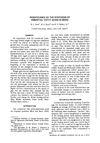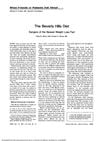 10 citations,
August 2019 in “The World Journal of Men's Health”
10 citations,
August 2019 in “The World Journal of Men's Health” Kimchi probiotics slightly improved hair density, but more research needed.
 4 citations,
December 2020 in “International journal of research - granthaalayah”
4 citations,
December 2020 in “International journal of research - granthaalayah” Tetracycline can stick to hair follicles and potentially cause hair loss.
 3 citations,
September 1975 in “Journal of animal science/Journal of animal science ... and ASAS reference compendium”
3 citations,
September 1975 in “Journal of animal science/Journal of animal science ... and ASAS reference compendium” Pigs can make some essential fats and don't need them all in their diet to grow and stay healthy.
 January 2018 in “International journal of food and nutrition research”
January 2018 in “International journal of food and nutrition research” Intermittent iron and nutritional supplements can help reduce hair loss.
 June 1996 in “Irish Journal of Medical Science (1971 -)”
June 1996 in “Irish Journal of Medical Science (1971 -)” The document summarizes medical findings on topics like heart rhythm treatment, sleep apnea therapy, and various health conditions and treatments.
 437 citations,
August 2014 in “Cell metabolism”
437 citations,
August 2014 in “Cell metabolism” Turning white fat into brown-like fat could help fight obesity and type 2 diabetes.
 271 citations,
September 2008 in “Nutrition reviews”
271 citations,
September 2008 in “Nutrition reviews” Vitamin D receptor interacts with certain dietary components to help prevent diseases and regulate hair growth.
 203 citations,
December 2004 in “Journal of The American Academy of Dermatology”
203 citations,
December 2004 in “Journal of The American Academy of Dermatology” Early diagnosis and treatment, using finasteride, minoxidil, or hair transplantation, improves hair loss outcomes.
 138 citations,
November 2015 in “Journal of Pharmacology and Experimental Therapeutics”
138 citations,
November 2015 in “Journal of Pharmacology and Experimental Therapeutics” Protoporphyrin IX is useful in cancer treatment but can cause health problems if not properly regulated.
 104 citations,
May 2003 in “Endocrinology”
104 citations,
May 2003 in “Endocrinology” Lampreys have a functional vitamin D receptor that may help detoxify harmful substances.
 76 citations,
May 2007 in “Menopause International”
76 citations,
May 2007 in “Menopause International” After menopause, women lose a lot of skin collagen, but estrogen replacement might improve skin health.
 44 citations,
October 2011 in “Gynecological Endocrinology”
44 citations,
October 2011 in “Gynecological Endocrinology” Menopause significantly reduces skin collagen, leading to thinner, less elastic skin, and hormone replacement may help but requires careful consideration.
 31 citations,
February 2014 in “Journal of dermatological science”
31 citations,
February 2014 in “Journal of dermatological science” Placental growth factor may help treat hair loss.
 27 citations,
March 2013 in “Social Semiotics”
27 citations,
March 2013 in “Social Semiotics” Commercial hair loss websites promote Propecia by making men feel insecure about baldness and suggesting it's a medical issue needing treatment.
 25 citations,
June 2014 in “Journal of Endocrinology/Journal of endocrinology”
25 citations,
June 2014 in “Journal of Endocrinology/Journal of endocrinology” Human sebaceous glands contain enzymes that affect androgen production and may influence sebum production and acne.
 21 citations,
December 2012 in “Maturitas”
21 citations,
December 2012 in “Maturitas” Testosterone implants in women require pharmacological dosing to be effective and are generally safe and well-tolerated.
 20 citations,
February 2003 in “Facial Plastic Surgery”
20 citations,
February 2003 in “Facial Plastic Surgery” Treat adult facial vascular anomalies with lasers, surgery, or observation, depending on the patient's specific condition.
 18 citations,
November 1981 in “JAMA”
18 citations,
November 1981 in “JAMA” The Beverly Hills Diet is unscientific, potentially harmful, and could cause serious health issues.
 16 citations,
March 2007 in “The Veterinary clinics of North America. Food animal practice”
16 citations,
March 2007 in “The Veterinary clinics of North America. Food animal practice” Proper mineral supplementation in cow-calf operations prevents health issues and economic losses.
 13 citations,
October 2010 in “Pharmacogenomics”
13 citations,
October 2010 in “Pharmacogenomics” Researchers found that most genes affecting drug responses are not fully covered by commercial SNP chips, suggesting the need for more comprehensive tools to optimize drug selection based on genetics.
 12 citations,
January 2016 in “Journal of Clinical and Investigative Dermatology”
12 citations,
January 2016 in “Journal of Clinical and Investigative Dermatology” Low vitamin D levels are common in people with Alopecia Areata.
 10 citations,
October 2020 in “Frontiers in Cell and Developmental Biology”
10 citations,
October 2020 in “Frontiers in Cell and Developmental Biology” Wounds can regenerate hair in young mice, but this ability declines with age, offering insights for improving tissue regeneration in the elderly.
 10 citations,
May 1986 in “Experientia”
10 citations,
May 1986 in “Experientia” Too much zinc in the diet can cause hair loss and color change in young mice by reducing copper in the body.
 7 citations,
June 2021 in “Trends in Food Science and Technology”
7 citations,
June 2021 in “Trends in Food Science and Technology” Western diet may cause male pattern baldness; low glycemic diet with magnesium could help.
 6 citations,
August 2014 in “Toxicologic pathology”
6 citations,
August 2014 in “Toxicologic pathology” Blocking DGAT1 reduces oil gland size in mice and dogs, but only mice experience hair loss.
 December 2023 in “Malahayati International Journal of Nursing and Health Science”
December 2023 in “Malahayati International Journal of Nursing and Health Science” Chemotherapy in children often causes hair loss, nausea, vomiting, and mood swings.
 October 2023 in “JOJ dermatology & cosmetics”
October 2023 in “JOJ dermatology & cosmetics” Thiocyanate helps hair growth and can be supplemented in diet or applied topically.

L-PGDS has specific binding sites for its functions and could help in drug delivery system design.
 September 2004 in “Experimental dermatology”
September 2004 in “Experimental dermatology” Melatonin directly affects mouse hair follicles and may influence hair growth.

Iron and zinc deficiencies may be treated to help female hair loss.






























